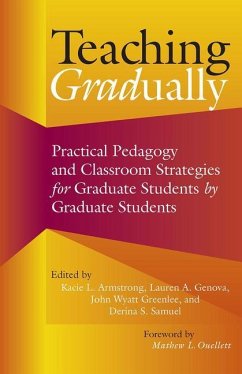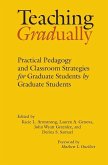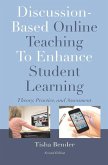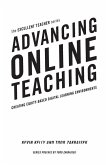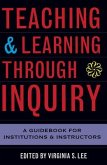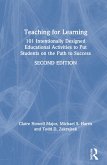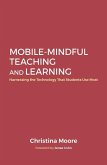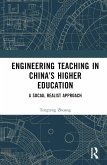Teaching Gradually
Practical Pedagogy for Graduate Students, by Graduate Students
Herausgeber: Armstrong, Kacie L.; Greenlee, John Wyatt; Genova, Lauren A.
Teaching Gradually
Practical Pedagogy for Graduate Students, by Graduate Students
Herausgeber: Armstrong, Kacie L.; Greenlee, John Wyatt; Genova, Lauren A.
- Broschiertes Buch
- Merkliste
- Auf die Merkliste
- Bewerten Bewerten
- Teilen
- Produkt teilen
- Produkterinnerung
- Produkterinnerung
This book covers a wide range of topics designed to appeal to graduate student instructors across disciplines, from those teaching discussion sections, to those managing studio classes and lab sessions, to those serving as the instructor of record for their own course.
Andere Kunden interessierten sich auch für
![Teaching Gradually Teaching Gradually]() Teaching Gradually201,99 €
Teaching Gradually201,99 €![Discussion-Based Online Teaching To Enhance Student Learning Discussion-Based Online Teaching To Enhance Student Learning]() Discussion-Based Online Teaching To Enhance Student Learning51,99 €
Discussion-Based Online Teaching To Enhance Student Learning51,99 €![Advancing Online Teaching Advancing Online Teaching]() Kevin KellyAdvancing Online Teaching200,99 €
Kevin KellyAdvancing Online Teaching200,99 €![Teaching and Learning Through Inquiry Teaching and Learning Through Inquiry]() Teaching and Learning Through Inquiry45,99 €
Teaching and Learning Through Inquiry45,99 €![Teaching for Learning Teaching for Learning]() Claire Howell MajorTeaching for Learning201,99 €
Claire Howell MajorTeaching for Learning201,99 €![Mobile-Mindful Teaching and Learning Mobile-Mindful Teaching and Learning]() Christina MooreMobile-Mindful Teaching and Learning200,99 €
Christina MooreMobile-Mindful Teaching and Learning200,99 €![Engineering Teaching in China's Higher Education Engineering Teaching in China's Higher Education]() Tengteng ZhuangEngineering Teaching in China's Higher Education200,99 €
Tengteng ZhuangEngineering Teaching in China's Higher Education200,99 €-
-
-
This book covers a wide range of topics designed to appeal to graduate student instructors across disciplines, from those teaching discussion sections, to those managing studio classes and lab sessions, to those serving as the instructor of record for their own course.
Hinweis: Dieser Artikel kann nur an eine deutsche Lieferadresse ausgeliefert werden.
Hinweis: Dieser Artikel kann nur an eine deutsche Lieferadresse ausgeliefert werden.
Produktdetails
- Produktdetails
- Verlag: Routledge
- Seitenzahl: 332
- Erscheinungstermin: 1. Oktober 2021
- Englisch
- Abmessung: 254mm x 178mm x 18mm
- Gewicht: 626g
- ISBN-13: 9781642671612
- ISBN-10: 1642671614
- Artikelnr.: 62028693
- Herstellerkennzeichnung
- Books on Demand GmbH
- In de Tarpen 42
- 22848 Norderstedt
- info@bod.de
- 040 53433511
- Verlag: Routledge
- Seitenzahl: 332
- Erscheinungstermin: 1. Oktober 2021
- Englisch
- Abmessung: 254mm x 178mm x 18mm
- Gewicht: 626g
- ISBN-13: 9781642671612
- ISBN-10: 1642671614
- Artikelnr.: 62028693
- Herstellerkennzeichnung
- Books on Demand GmbH
- In de Tarpen 42
- 22848 Norderstedt
- info@bod.de
- 040 53433511
Kacie L. Armstrong is a visiting assistant professor of psychology at Bowdoin College in Brunswick, Maine. She holds a BA in media and communication studies and a BS in psychology from the University of Maryland, Baltimore County, an MA with distinction in film and visual studies from Queen's University Belfast, and an MA and PhD in psychology from Cornell University. As a researcher, her work focuses on face perception and the emotion of nostalgia. As an educator, her teaching practices are grounded in civic engagement as she guides students in using the power of prose and dialogue to drive social change. Her dedication to innovative and inclusive teaching has been recognized through a dean's prize for distinguished teaching at Cornell University and the Buttrick-Crippen fellowship, which supported her in developing a new 1st-year writing seminar titled "Promoting Progress Through Psychology." Outside of academia, she enjoys hiking, writing, and hygge. Lauren A. Genova is an assistant professor in the Department of Chemistry and Biochemistry at the University of Delaware. She holds an honors BS degree with distinction in chemistry from the University of Delaware and MS and PhD degrees in chemistry and chemical biology from Cornell University. In addition to conducting research in single-molecule biophysics, she is trained in STEM education research. Over the years, she has facilitated learning in numerous capacities, ranging from instructing undergraduates to leading pedagogy workshops for graduate students, postdoctoral students, and faculty. Her deep commitment to improving the educational experience of undergraduate students has motivated her to serve on chemistry curriculum and diversity committees at both her undergraduate and graduate institutions. She is passionate about using evidence-based teaching strategies to cultivate a welcoming and empowering learning environment for students from all backgrounds. John Wyatt Greenlee holds a BA in history from Hamilton College; master's degrees in public affairs (Park University), history (East Tennessee State University), and medieval studies (Cornell University); and a PhD in medieval studies (Cornell University). He studies cartographic and spatial history, and his current research examines the role of eels in medieval and early modern English cultural history. A varied employment history includes a stint with the Pete Seeger-founded quarterly publication Sing Out! Magazine, several summers as a white-water rafting guide, and a decade coaching collegiate volleyball. While at Cornell he was a fellow with the Center for Teaching Innovation for 3 years, and he is particularly interested in kinetic learning techniques and pedagogical innovation as a way to improve students' interaction with historical materials. Derina S. Samuel is the associate director for graduate student development at the Center for Teaching Innovation (CTI), Cornell University. In this capacity, she provides leadership for a variety of graduate programs, including the CTI Graduate Teaching Fellows program and the Teaching Portfolio program. Her teaching experience spans various institutions and courses. Most recently, she led the development and successful launch of a university-wide online orientation for new teaching assistants, as well as a teaching guide designed as a resource for all Cornell University instructors. She holds a PhD in biochemistry, an MA in public administration from Syracuse University, and a BSc and an MSc in chemistry from the University of Zambia. Her research and teaching interests focus on supporting the professional development of graduate students and postdoctoral scholars.
Foreword-Mathew Ouellett Preface Introduction Part One. The Science Behind
Learning 1. Opportunities and Precarities of Active Learning Approaches for
Graduate Student Instructors - Diana Rose Newby 2. Introducing
Metacognition (or Thinking About Your Thinking. in the Classroom -
Stephany Santos 3. Teaching Students How to Effectively Take Notes - Julia
Nolte and Hamid B. Turker 4. What Do They Already Know? Tackling
Differences in Students' Prior Knowledge-Aditya Anupam Part Two. The
Instructional Role of Graduate Student Instructors Developing a Teaching
Identity 5. The Not-So-Smooth Transition From Teaching Assistant to
Instructor of Record - Becky Tang 6. Teaching Practices Advocating Against
Gender Bias and Combatting Impostor Syndrome - Sarah Klanderman and Reshma
Menon Leading Discussions and Holding Office Hours 7. Using Deliberate
Practice to Help Students Learn From Discussion - Cory Davia 8.
Standing-Room-Only Office Hour Strategies - Rachel Bristol Conducting Lab
Sessions 9. Supporting Inquiry and Inclusion in Science Labs -Danny
Doucette 10. An Innovative, Interactive Class Design for an Engineering
Laboratory - Amir Saeidi Navigating Studio-Based Pedagogy 11. Teaching
History for the Studio. Engaging Studio-Based Students - Athanasiou Geolas
12. Teaching Interdisciplinary Travel Studio Courses. Practical
Experiences From the Urban Humanities -Jonathan Banfill Serving as an
Instructor of Record 13. Creating New Courses Using Backward Design -
Jessica Kansky and Jessica Taggart 14. Teaching in the Moment. Lessons From
Improv - Alexander Bower 15. The Power of Productive Struggle - Arielle
Grim-McNally 16. Using Mastery Objective to Foster Inclusive Teaching -
Sean Colonna 17. Making Groupwork Work - Valentin B. Küchle and Jihye Hwang
18. Is This Above My Pay Grade? Turning a Cheating Scandal Into a Teaching
Moment - Dean Jordan 19. Difficult Conversations in Class. How Not to Panic
- Kirsten Darby Smith Incorporating Technology in the Classroom 20.
Tackling the Challenges of the Online Classroom. Student Motivation and
Active Learning - Dana Simionescu 21. Facilitating Meaningful Interactions
in Synchronous Online Courses - Jack Ryan Sturm 22. Setting Digital
Projects in Undergraduate Courses - Krithika Vachali and John Wyatt
Greenlee Part Three. The Inclusive Classroom Empowering All Learners 23.
Building Rapport. How Active Learning Strategies Create Inclusivity in the
First-Year Classroom - Stephen Reaugh 24. Transparent and Flexibile
Teaching for the Inclusive Classroom - Dana Mirsalis 25. UDL Practices.
Contextual Difference and the Difference It Makes - Maya Hey 26. Beyond
Group Discussions. Differentiated Instruction in the College Writing
Classroom -Sara Lovett Utilizing the Strength of a Diverse Classroom 27.
Increasing Diversity, Decreasing Alienation. Teaching Liberal Arts Courses
to Diverse Student Bodies - Lindsey Peterson 28. Embracing the Value of
Cultural Wealth From Underrepresented Groups - Edgar Virguez Overcoming
Instructor Challenges 29. Renegotiating Power in Teaching and Learning.
Feminist Pedagogical Practices for an Inclusive Composition Classroom -
Alex Brostoff and Marlena Gittleman 30. Making My Classroom Accessible for
Me. Digital Practice as Inclusive Pedagogy - Andrew Jenks 31. Positions in
Communication. Creating Space for International Graduate Students and
Teachers - William Kingsland Part Four. Assessment of Teaching and Learning
32. Engaging and Assessing Gen Z - Alisha Nypaver 33. Reframing Learning
Goals Through Assessment - Rachana Bhave 34. Accretive Method. Feedback for
Student Writing Growth - Kailana Durnan and Ariel Martino 35. What Is a
Participation Grade? Inclusive Strategies for Engaging Students and
Assessing Participation - Valeria Bondura Part Five. Research Skills for
Students 26. Teaching Your Students How to Critically Read the Primary
Literature - Lauren A. Genova and Kacie L. Armstrong 37. Multiple Modes of
Learning, Multiple Means of Belonging. Special Collections and the
Undergraduate Classroom - Gina Marie Hurley 38. Course-Based Undergraduate
Research Experiences (CUREs). Scaffolding Research and Writing - Lindsey
Hendricks-Franco Part Six. Professional Development and Reflection 39.
Learning by Observing. The Art of an Effective Teaching Observation -
Zachary Domach 40. Mentoring Undergraduate Students - Eugene Law 41. Queer
Graduate Pedagogies. Destabilizing Power Binaries and Negotiating Authority
- Ruth Book and Alex Gatten 42. Feedback. Why You Need It, How to Get It,
and What to Do With It -Emily Kerr Index Editor and Contributors
Learning 1. Opportunities and Precarities of Active Learning Approaches for
Graduate Student Instructors - Diana Rose Newby 2. Introducing
Metacognition (or Thinking About Your Thinking. in the Classroom -
Stephany Santos 3. Teaching Students How to Effectively Take Notes - Julia
Nolte and Hamid B. Turker 4. What Do They Already Know? Tackling
Differences in Students' Prior Knowledge-Aditya Anupam Part Two. The
Instructional Role of Graduate Student Instructors Developing a Teaching
Identity 5. The Not-So-Smooth Transition From Teaching Assistant to
Instructor of Record - Becky Tang 6. Teaching Practices Advocating Against
Gender Bias and Combatting Impostor Syndrome - Sarah Klanderman and Reshma
Menon Leading Discussions and Holding Office Hours 7. Using Deliberate
Practice to Help Students Learn From Discussion - Cory Davia 8.
Standing-Room-Only Office Hour Strategies - Rachel Bristol Conducting Lab
Sessions 9. Supporting Inquiry and Inclusion in Science Labs -Danny
Doucette 10. An Innovative, Interactive Class Design for an Engineering
Laboratory - Amir Saeidi Navigating Studio-Based Pedagogy 11. Teaching
History for the Studio. Engaging Studio-Based Students - Athanasiou Geolas
12. Teaching Interdisciplinary Travel Studio Courses. Practical
Experiences From the Urban Humanities -Jonathan Banfill Serving as an
Instructor of Record 13. Creating New Courses Using Backward Design -
Jessica Kansky and Jessica Taggart 14. Teaching in the Moment. Lessons From
Improv - Alexander Bower 15. The Power of Productive Struggle - Arielle
Grim-McNally 16. Using Mastery Objective to Foster Inclusive Teaching -
Sean Colonna 17. Making Groupwork Work - Valentin B. Küchle and Jihye Hwang
18. Is This Above My Pay Grade? Turning a Cheating Scandal Into a Teaching
Moment - Dean Jordan 19. Difficult Conversations in Class. How Not to Panic
- Kirsten Darby Smith Incorporating Technology in the Classroom 20.
Tackling the Challenges of the Online Classroom. Student Motivation and
Active Learning - Dana Simionescu 21. Facilitating Meaningful Interactions
in Synchronous Online Courses - Jack Ryan Sturm 22. Setting Digital
Projects in Undergraduate Courses - Krithika Vachali and John Wyatt
Greenlee Part Three. The Inclusive Classroom Empowering All Learners 23.
Building Rapport. How Active Learning Strategies Create Inclusivity in the
First-Year Classroom - Stephen Reaugh 24. Transparent and Flexibile
Teaching for the Inclusive Classroom - Dana Mirsalis 25. UDL Practices.
Contextual Difference and the Difference It Makes - Maya Hey 26. Beyond
Group Discussions. Differentiated Instruction in the College Writing
Classroom -Sara Lovett Utilizing the Strength of a Diverse Classroom 27.
Increasing Diversity, Decreasing Alienation. Teaching Liberal Arts Courses
to Diverse Student Bodies - Lindsey Peterson 28. Embracing the Value of
Cultural Wealth From Underrepresented Groups - Edgar Virguez Overcoming
Instructor Challenges 29. Renegotiating Power in Teaching and Learning.
Feminist Pedagogical Practices for an Inclusive Composition Classroom -
Alex Brostoff and Marlena Gittleman 30. Making My Classroom Accessible for
Me. Digital Practice as Inclusive Pedagogy - Andrew Jenks 31. Positions in
Communication. Creating Space for International Graduate Students and
Teachers - William Kingsland Part Four. Assessment of Teaching and Learning
32. Engaging and Assessing Gen Z - Alisha Nypaver 33. Reframing Learning
Goals Through Assessment - Rachana Bhave 34. Accretive Method. Feedback for
Student Writing Growth - Kailana Durnan and Ariel Martino 35. What Is a
Participation Grade? Inclusive Strategies for Engaging Students and
Assessing Participation - Valeria Bondura Part Five. Research Skills for
Students 26. Teaching Your Students How to Critically Read the Primary
Literature - Lauren A. Genova and Kacie L. Armstrong 37. Multiple Modes of
Learning, Multiple Means of Belonging. Special Collections and the
Undergraduate Classroom - Gina Marie Hurley 38. Course-Based Undergraduate
Research Experiences (CUREs). Scaffolding Research and Writing - Lindsey
Hendricks-Franco Part Six. Professional Development and Reflection 39.
Learning by Observing. The Art of an Effective Teaching Observation -
Zachary Domach 40. Mentoring Undergraduate Students - Eugene Law 41. Queer
Graduate Pedagogies. Destabilizing Power Binaries and Negotiating Authority
- Ruth Book and Alex Gatten 42. Feedback. Why You Need It, How to Get It,
and What to Do With It -Emily Kerr Index Editor and Contributors
Foreword-Mathew Ouellett Preface Introduction Part One. The Science Behind
Learning 1. Opportunities and Precarities of Active Learning Approaches for
Graduate Student Instructors - Diana Rose Newby 2. Introducing
Metacognition (or Thinking About Your Thinking. in the Classroom -
Stephany Santos 3. Teaching Students How to Effectively Take Notes - Julia
Nolte and Hamid B. Turker 4. What Do They Already Know? Tackling
Differences in Students' Prior Knowledge-Aditya Anupam Part Two. The
Instructional Role of Graduate Student Instructors Developing a Teaching
Identity 5. The Not-So-Smooth Transition From Teaching Assistant to
Instructor of Record - Becky Tang 6. Teaching Practices Advocating Against
Gender Bias and Combatting Impostor Syndrome - Sarah Klanderman and Reshma
Menon Leading Discussions and Holding Office Hours 7. Using Deliberate
Practice to Help Students Learn From Discussion - Cory Davia 8.
Standing-Room-Only Office Hour Strategies - Rachel Bristol Conducting Lab
Sessions 9. Supporting Inquiry and Inclusion in Science Labs -Danny
Doucette 10. An Innovative, Interactive Class Design for an Engineering
Laboratory - Amir Saeidi Navigating Studio-Based Pedagogy 11. Teaching
History for the Studio. Engaging Studio-Based Students - Athanasiou Geolas
12. Teaching Interdisciplinary Travel Studio Courses. Practical
Experiences From the Urban Humanities -Jonathan Banfill Serving as an
Instructor of Record 13. Creating New Courses Using Backward Design -
Jessica Kansky and Jessica Taggart 14. Teaching in the Moment. Lessons From
Improv - Alexander Bower 15. The Power of Productive Struggle - Arielle
Grim-McNally 16. Using Mastery Objective to Foster Inclusive Teaching -
Sean Colonna 17. Making Groupwork Work - Valentin B. Küchle and Jihye Hwang
18. Is This Above My Pay Grade? Turning a Cheating Scandal Into a Teaching
Moment - Dean Jordan 19. Difficult Conversations in Class. How Not to Panic
- Kirsten Darby Smith Incorporating Technology in the Classroom 20.
Tackling the Challenges of the Online Classroom. Student Motivation and
Active Learning - Dana Simionescu 21. Facilitating Meaningful Interactions
in Synchronous Online Courses - Jack Ryan Sturm 22. Setting Digital
Projects in Undergraduate Courses - Krithika Vachali and John Wyatt
Greenlee Part Three. The Inclusive Classroom Empowering All Learners 23.
Building Rapport. How Active Learning Strategies Create Inclusivity in the
First-Year Classroom - Stephen Reaugh 24. Transparent and Flexibile
Teaching for the Inclusive Classroom - Dana Mirsalis 25. UDL Practices.
Contextual Difference and the Difference It Makes - Maya Hey 26. Beyond
Group Discussions. Differentiated Instruction in the College Writing
Classroom -Sara Lovett Utilizing the Strength of a Diverse Classroom 27.
Increasing Diversity, Decreasing Alienation. Teaching Liberal Arts Courses
to Diverse Student Bodies - Lindsey Peterson 28. Embracing the Value of
Cultural Wealth From Underrepresented Groups - Edgar Virguez Overcoming
Instructor Challenges 29. Renegotiating Power in Teaching and Learning.
Feminist Pedagogical Practices for an Inclusive Composition Classroom -
Alex Brostoff and Marlena Gittleman 30. Making My Classroom Accessible for
Me. Digital Practice as Inclusive Pedagogy - Andrew Jenks 31. Positions in
Communication. Creating Space for International Graduate Students and
Teachers - William Kingsland Part Four. Assessment of Teaching and Learning
32. Engaging and Assessing Gen Z - Alisha Nypaver 33. Reframing Learning
Goals Through Assessment - Rachana Bhave 34. Accretive Method. Feedback for
Student Writing Growth - Kailana Durnan and Ariel Martino 35. What Is a
Participation Grade? Inclusive Strategies for Engaging Students and
Assessing Participation - Valeria Bondura Part Five. Research Skills for
Students 26. Teaching Your Students How to Critically Read the Primary
Literature - Lauren A. Genova and Kacie L. Armstrong 37. Multiple Modes of
Learning, Multiple Means of Belonging. Special Collections and the
Undergraduate Classroom - Gina Marie Hurley 38. Course-Based Undergraduate
Research Experiences (CUREs). Scaffolding Research and Writing - Lindsey
Hendricks-Franco Part Six. Professional Development and Reflection 39.
Learning by Observing. The Art of an Effective Teaching Observation -
Zachary Domach 40. Mentoring Undergraduate Students - Eugene Law 41. Queer
Graduate Pedagogies. Destabilizing Power Binaries and Negotiating Authority
- Ruth Book and Alex Gatten 42. Feedback. Why You Need It, How to Get It,
and What to Do With It -Emily Kerr Index Editor and Contributors
Learning 1. Opportunities and Precarities of Active Learning Approaches for
Graduate Student Instructors - Diana Rose Newby 2. Introducing
Metacognition (or Thinking About Your Thinking. in the Classroom -
Stephany Santos 3. Teaching Students How to Effectively Take Notes - Julia
Nolte and Hamid B. Turker 4. What Do They Already Know? Tackling
Differences in Students' Prior Knowledge-Aditya Anupam Part Two. The
Instructional Role of Graduate Student Instructors Developing a Teaching
Identity 5. The Not-So-Smooth Transition From Teaching Assistant to
Instructor of Record - Becky Tang 6. Teaching Practices Advocating Against
Gender Bias and Combatting Impostor Syndrome - Sarah Klanderman and Reshma
Menon Leading Discussions and Holding Office Hours 7. Using Deliberate
Practice to Help Students Learn From Discussion - Cory Davia 8.
Standing-Room-Only Office Hour Strategies - Rachel Bristol Conducting Lab
Sessions 9. Supporting Inquiry and Inclusion in Science Labs -Danny
Doucette 10. An Innovative, Interactive Class Design for an Engineering
Laboratory - Amir Saeidi Navigating Studio-Based Pedagogy 11. Teaching
History for the Studio. Engaging Studio-Based Students - Athanasiou Geolas
12. Teaching Interdisciplinary Travel Studio Courses. Practical
Experiences From the Urban Humanities -Jonathan Banfill Serving as an
Instructor of Record 13. Creating New Courses Using Backward Design -
Jessica Kansky and Jessica Taggart 14. Teaching in the Moment. Lessons From
Improv - Alexander Bower 15. The Power of Productive Struggle - Arielle
Grim-McNally 16. Using Mastery Objective to Foster Inclusive Teaching -
Sean Colonna 17. Making Groupwork Work - Valentin B. Küchle and Jihye Hwang
18. Is This Above My Pay Grade? Turning a Cheating Scandal Into a Teaching
Moment - Dean Jordan 19. Difficult Conversations in Class. How Not to Panic
- Kirsten Darby Smith Incorporating Technology in the Classroom 20.
Tackling the Challenges of the Online Classroom. Student Motivation and
Active Learning - Dana Simionescu 21. Facilitating Meaningful Interactions
in Synchronous Online Courses - Jack Ryan Sturm 22. Setting Digital
Projects in Undergraduate Courses - Krithika Vachali and John Wyatt
Greenlee Part Three. The Inclusive Classroom Empowering All Learners 23.
Building Rapport. How Active Learning Strategies Create Inclusivity in the
First-Year Classroom - Stephen Reaugh 24. Transparent and Flexibile
Teaching for the Inclusive Classroom - Dana Mirsalis 25. UDL Practices.
Contextual Difference and the Difference It Makes - Maya Hey 26. Beyond
Group Discussions. Differentiated Instruction in the College Writing
Classroom -Sara Lovett Utilizing the Strength of a Diverse Classroom 27.
Increasing Diversity, Decreasing Alienation. Teaching Liberal Arts Courses
to Diverse Student Bodies - Lindsey Peterson 28. Embracing the Value of
Cultural Wealth From Underrepresented Groups - Edgar Virguez Overcoming
Instructor Challenges 29. Renegotiating Power in Teaching and Learning.
Feminist Pedagogical Practices for an Inclusive Composition Classroom -
Alex Brostoff and Marlena Gittleman 30. Making My Classroom Accessible for
Me. Digital Practice as Inclusive Pedagogy - Andrew Jenks 31. Positions in
Communication. Creating Space for International Graduate Students and
Teachers - William Kingsland Part Four. Assessment of Teaching and Learning
32. Engaging and Assessing Gen Z - Alisha Nypaver 33. Reframing Learning
Goals Through Assessment - Rachana Bhave 34. Accretive Method. Feedback for
Student Writing Growth - Kailana Durnan and Ariel Martino 35. What Is a
Participation Grade? Inclusive Strategies for Engaging Students and
Assessing Participation - Valeria Bondura Part Five. Research Skills for
Students 26. Teaching Your Students How to Critically Read the Primary
Literature - Lauren A. Genova and Kacie L. Armstrong 37. Multiple Modes of
Learning, Multiple Means of Belonging. Special Collections and the
Undergraduate Classroom - Gina Marie Hurley 38. Course-Based Undergraduate
Research Experiences (CUREs). Scaffolding Research and Writing - Lindsey
Hendricks-Franco Part Six. Professional Development and Reflection 39.
Learning by Observing. The Art of an Effective Teaching Observation -
Zachary Domach 40. Mentoring Undergraduate Students - Eugene Law 41. Queer
Graduate Pedagogies. Destabilizing Power Binaries and Negotiating Authority
- Ruth Book and Alex Gatten 42. Feedback. Why You Need It, How to Get It,
and What to Do With It -Emily Kerr Index Editor and Contributors

